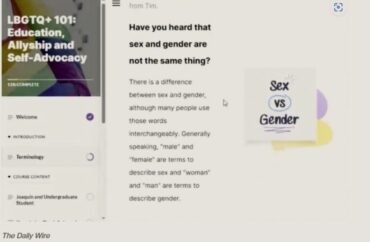
‘Deadnaming’ is ‘violent act,’ can ‘trigger a trauma response’
A professor who calls a person by their birth name and not their new chosen name commits a “violent act,” according to an LGBT training offered by the Massachusetts Institute of Technology.
The “LGBTQ 101+” training is one of three sexual harassment modules offered to faculty, staff, and graduate students at the private university in Cambridge. The Daily Wire obtained and reviewed the full training module.
The Daily Wire reported:
One portion discusses and defines the concept of “deadnaming,” using the birth and often legal name of an individual who identifies as transgender and who has taken on a new name. The training defines it as “the act of referring to a transgender or nonbinary person by a name they used prior to transitioning.” It even goes on to say “deadnaming is invalidating and may trigger a trauma response” and warns against “misgendering.”
Calling someone by their birth name, “brings all of their negative life experience with that name to the surface … it is considered a violent act.”
The training repeats other regular LGBT talking points, including that “gender” and “sex” are different and that “gender is a spectrum.”
However, the term “gender” was not traditionally understood as distinct from “sex.” Instead, people would use the term to avoid saying “sex” in conversation, given the dual meaning of the word, according to Professor John Grabowski at the Catholic University of America.
MIT personnel should ensure their workplaces are “affirming,” according to the presentation.
The Daily Wire reported:
Staff and faculty are also instructed to make their workplaces more “affirming” by using certain terms and avoiding others. “Provide space regularly in your lab/department/office/classrooms to share their pronouns. Avoid using binary gendered language … instead use ‘they’ and ‘people’ as gender neutral terms,” the training says.
“Are you a visible, dependable ally?” the training asks. “What have you done recently, or what are you planning on doing, that can contribute to a feeling of LGBTQ+ belonging at MIT?”
A portion titled “let’s talk about allyship” assures trainees that “there are many different forms of allyship” before explaining “queer cisgender people can be an ally to trans and non-binary individuals” and “white queer and heterosexual individuals can be an ally to queer and trans people of color.”
“What are some specific steps that you can take to be an active ally /better advocate on behalf of LGBTQ+ members,” the presentation asks.
“What can you do at a policy level … to help influence/change policies to be more LGBTQ+ inclusive within your lab/department/classroom?”
MORE: UW-Madison DEI forum ‘triggered’ black woman during racism discussion
IMAGE: The Daily Wire
Like The College Fix on Facebook / Follow us on Twitter





Please join the conversation about our stories on Facebook, Twitter, Instagram, Reddit, MeWe, Rumble, Gab, Minds and Gettr.